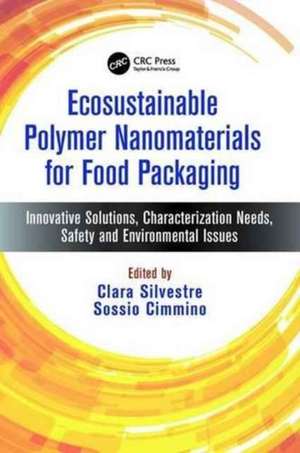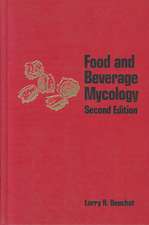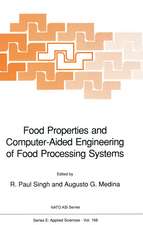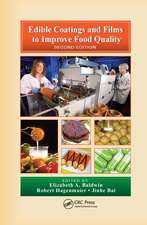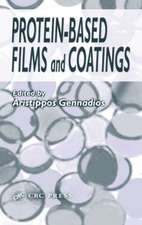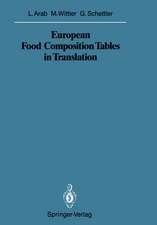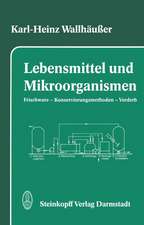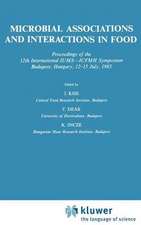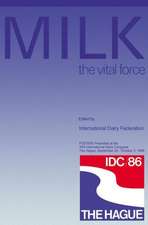Ecosustainable Polymer Nanomaterials for Food Packaging: Innovative Solutions, Characterization Needs, Safety and Environmental Issues
Editat de Clara Silvestre, Sossio Cimminoen Limba Engleză Paperback – 19 oct 2016
Focusing on current developments in nanomaterial packaging applications most likely to be accepted by consumers and attract regulatory attention in the immediate future, the book begins with a general introduction to current issues and future trends. The remaining chapters explore:
- The concept of "ethical design"—putting into practice key ideas such as the precautionary principle and presenting a model for accountability, responsibility, and ethical consideration
- The evolution of the rheology, structure, and morphology of nanomaterials with regard to processing conditions and constituents
- The application of plasma technologies for the production of barrier coatings on polymeric materials by nonequilibrium gas discharges
- Nanomaterials for food packaging developed from oil polymers (polyolefins) and from renewable resource polymers
- The use of cellulose nanowhiskers for food biopackaging and edible nano-laminate coatings
- The interactions of nanomaterials with food
- Examples of degradation under natural weathering, exposure, and recycling
| Toate formatele și edițiile | Preț | Express |
|---|---|---|
| Paperback (1) | 475.31 lei 6-8 săpt. | |
| CRC Press – 19 oct 2016 | 475.31 lei 6-8 săpt. | |
| Hardback (1) | 1334.90 lei 6-8 săpt. | |
| CRC Press – 16 ian 2013 | 1334.90 lei 6-8 săpt. |
Preț: 475.31 lei
Nou
Puncte Express: 713
Preț estimativ în valută:
90.95€ • 94.96$ • 75.27£
90.95€ • 94.96$ • 75.27£
Carte tipărită la comandă
Livrare economică 04-18 aprilie
Preluare comenzi: 021 569.72.76
Specificații
ISBN-13: 9781138034266
ISBN-10: 1138034266
Pagini: 406
Ilustrații: 154
Dimensiuni: 156 x 234 x 31 mm
Greutate: 0.59 kg
Ediția:1
Editura: CRC Press
Colecția CRC Press
ISBN-10: 1138034266
Pagini: 406
Ilustrații: 154
Dimensiuni: 156 x 234 x 31 mm
Greutate: 0.59 kg
Ediția:1
Editura: CRC Press
Colecția CRC Press
Cuprins
Polymer Nanomaterials for Food Packaging: Current Issues and Future Trends. Ethics, Communication, and Safety in the Use of PNFP. Evolution of Rheology, Structure, and Properties around the Rheological Flocculation and Percolation Thresholds in Polymer Nanocomposites. Characterization of Safe Nanostructured Polymeric Materials. Plasma Technology for Polymer Food Packaging Materials. Polypropylene and Polyethylene-Based Nanocomposites for Food Packaging Applications. Some Aspects Concerning the Nanomaterials from Renewable Resources Use in Food Packaging. Cellulose Nanowhiskers: Properties and Applications as Nanofillers in Nanocomposites with Interest in Food Biopackaging Applications. Edible Nano-Laminate Coatings for Food Applications. Potential Application of Nanomaterials in Food Packaging and Interactions of Nanomaterials with Food. Photodegradation of Poly(Lactic Acid)/Organo-Modified Clay Nanocomposites under Natural Weathering Exposure. Recycling of Nanocomposites. Polymer Nanocomposite Materials Used for Food Packaging. Index.
Notă biografică
Clara Silvestre, Sossio Cimmino
Descriere
Polymer nanotechnology offers exciting benefits to the food industry, including better materials for food packaging and safer foods on supermarket shelves. This volume examines the complete life cycle of packaging based on polymer nanomaterials. It begins with a general introduction to current issues and future trends. The remaining chapters explore the concept of ethical design; the rheology, structure, and morphology of nanomaterials; plasma technologies; and nanomaterials for food packaging developed from oil polymers and renewable resource polymers. It also discusses cellulose nanowhiskers, edible nano-laminate coatings, the interactions of nanomaterials with food, and degradation.
